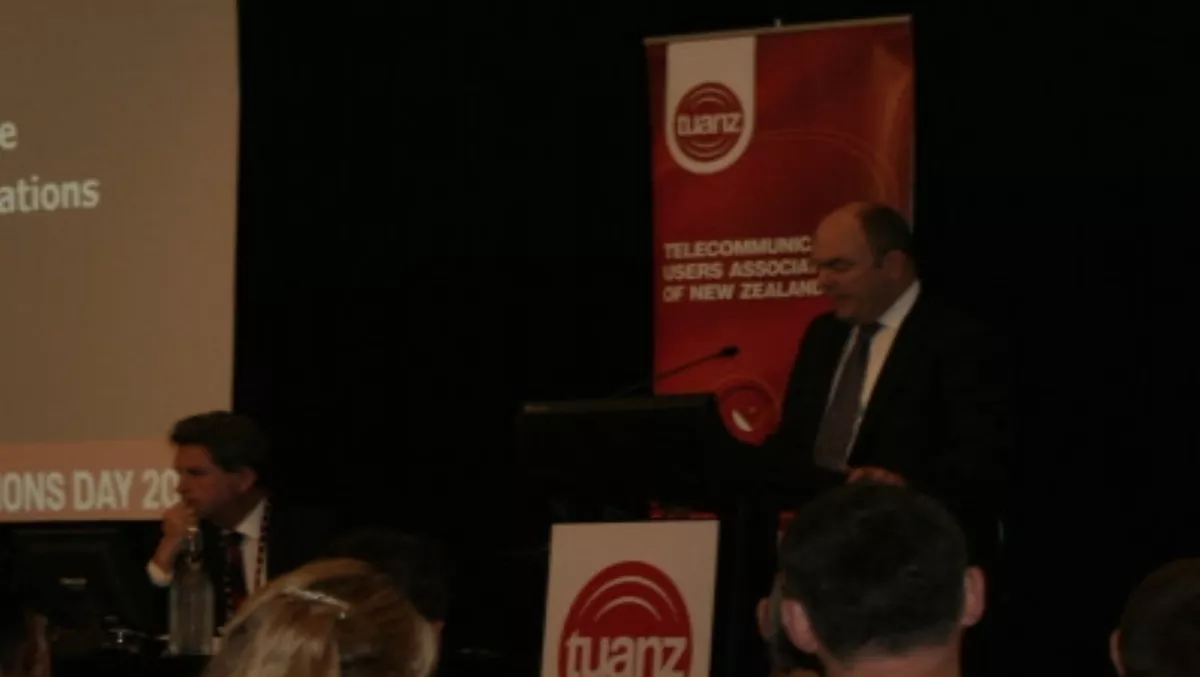
Top ten from Telco Day
The 2010 TUANZ Telecommunications Day on Tuesday was a nine-hour talkfest that provided a comprehensive insight into the thinking of telcos, users, regulators and policy makers. Here are the Telecommunications Review top ten take-homes.
1. TelstraClear CEO Allan Freeth on the Carriers panel. He supported Chorus as the government’s best partner in its Ultra Fast Broadband scheme, whether or not it was separated from Telecom. This was during a speech in which he slammed the UFB, labeling it a form of “network socialism”, and derided the regional fibre companies before claiming that TelstraClear can work with anyone.
2. Telecommunications Commissioner Ross Patterson sending out a statement in the morning asking ICT Minister Steven Joyce to take into account a Vodafone on-net offer when considering whether to regulate Mobile Termination Rates. And then not even mentioning it in his speech while journalists scrambled to get on-the-record comments from key participants in the debate who were seated in the room.
2a. Patterson dropping a dirty great hint at the end of his speech that SKY TV had better watch its back: “It is significant that, in particular in Europe, uptake of fast broadband services by consumers has been driven by demand for HDTV products delivered by telecommunications companies. It is apparent that similar offerings are not available to New Zealand consumers. This may be one of the reasons for a lack of demand (or more accurately, a lack of willingness to pay) for high speed services. This is a matter the Commission will be looking at in 2010/2011.” Am I putting two and two together and making five? Maybe. The Financial Times reported earlier this month that UK watchdog Ofcom is attempting to regulate BSkyB in Britain to force the pay TV channel to wholesale premium sports content, so Patterson has at least one international precedent to look to.
3. ICT Minister Steven Joyce on stimulating demand - in education with the National Education Network, in health with the National Health IT Board, in the government’s $2 billion per annum ICT spend with the Ministerial Committee on Government ICT. OK, so it’s a bunch of committees but at least its shows they’re serious about making sure the shiny new fibre network gets used.
4. Minister Joyce getting together with his opposite number in Australia, Senator Stephen Conroy and discussing what to do about mobile roaming changes. Later in the day the audience was told how these charges impact corporate users, with Air New Zealand limiting the number of iPhone users to a mere 45 and working on unified communication solutions so that staff visiting offshore locations don’t rack up huge bills on their smartphones.
5. OECD economist Taylor Reynolds’s speech. His research that shows that if there is a reduction in costs in electricity, transport and health by 0.5% - 1.5% through the efficient use of ICT it justifies the cost of a fibre network that is priced at between $NZ 2100 and $NZ 3,500 a connection. His claim that VDSL is becoming a dead-end technology in countries that were early adopters. His preference for a national broadband solution as opposed to the patchwork of networks being created in Europe. His warning that point-to-multipoint fibre rollouts have serious consequences for unbundling. His envy-inducing home broadband package with Free France which provides him with 100Mbps speed, 150 TV channels and no data cap for a mere $NZ57 a month.
6. Telecommunications Carriers Forum chief executive David Stone on his interesting meeting with Minister Joyce, where he was told that either Stone gets more telcos to sign up to the Telecommunications Disputes Resolution Scheme or the government will regulate the way customer complaints are handled. Are you listening CallPlus?
7. New Zealand Police CIO Anne Speden on the organisation’s leading edge technology which will see it trial electronic ticketing in Christchurch. Police officers will be equipped with a PDA and printer to type in the details and print the ticket on the spot. It’s unlikely to make getting a speeding ticket less painful but at least you can be impressed that the cops are using cool technology.
8. Chris Tigg from Air New Zealand informing us that our national airline has 55 developers working on its web platform, coming up with heaps of stuff like Twitter sites called airpointsfairy and flyairnz and looking at ways to integrate Twitter with the contact centre - they’ve already got the boss Rob Fyfe tweeting dissatisfied customers.
9. National Health IT Board director Graeme Osborne announcing that patient records will be electronic by 2014. So that if you live in Dunedin, but fall ill when visiting Hamilton, the doctor treating you can find out your past medical history quickly and easily. Osborne says that clinicians, hospital administrators and software vendors are being brought around to the view that a patient’s health record should actually belong to the patient.
10. Crown Fibre Holdings chief executive Graham Mitchell on his whirlwind tour of South Island visiting every one of those companies who’ve participate in a bid to partner with the government on the UFB. He pointed out it isn’t only a competitive process between bidders, it’s also between regions as to who will be first to get the network. Maybe they should run a Top Town competition - first in the egg-and-spoon race gets 1Gps, without datacaps, to play with.

